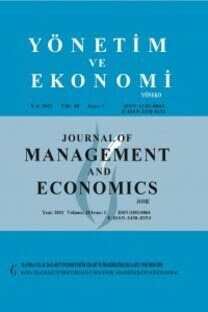Makroekonomik Açıdan Dibe Doğru Düşüşte Hizmet ve Sermaye Dolaşımı
Dibe Doğru Yarış, Uluslararası İşgücü Standartları, Küreselleşme, Makroekonomik etki
Service and Capital Circulation in the Race to the Bottom from a Makroekonomi Perspective
___
- Addo, K. (2015). Core Labour Standards and International Trade, Springer-Verlag Berlin Heidelberg, 2015.
- Aktay, N. (2011). Sosyal Güvenliğin Sağlanmasında Önemli Bir Unsur Olarak Çalışma Yaşamının Denetimine İlişkin Uluslararası Düzenlemeler. SGD-Sosyal Güvenlik Dergisi, 2(2).
- Anner, M. (2015). Stopping the Race to the Bottom. Challenges for Workers’ Rights in Supply Chains in Asia. Berlin: Friedrich-Ebert-Stiftung.
- Aydın, F. ve Albayrak, N. (2014). Türkiye Tarafından Onaylanan ILO Sözleşmeleri. T.C. Çalışma ve Sosyal Güvenlik Bakanlığı, Yayın No: 08, Ankara.
- Baştaymaz, T. (1998). Gelişmekte Olan Ülkelerdeki Açmaz: İşsizlik veya Kırsal Eksik İstihdam. Mercek Dergisi Mess Yayım, İstanbul.
- Davies, R. B. and Vadlamannati, K. C. (2013). A Race to The Bottom in Labor Standards? An Empirical Investigation. Journal of Development Economics, 103, 1-14.
- Erol, S. İ. (2016). İşgücü Piyasalarının Değişen Yapısı ve Sorunları. Yüzüncü Yıl Üniversitesi İktisadi ve İdari Bilimler Fakültesi Dergisi, (2), 34-56.
- ILO, (2016). World Employment Social Outlook, Geneva.
- Kalkınma Bakanlığı, (2018). On Birinci Kalkınma Planı (2019-2023). İşgücü Piyasası ve Genç İstihdamı Özel İhtisas Komisyonu Raporu.
- Karaaslan, İ. ve Şenkal, A. (2019). Labour Migration and International Labour Standards: An Assessment in Terms of Labour Market. İnsan ve İnsan, 6(19), 45-62.
- Krueger A. B., (1996). Observatıons on Internatıonal Labor Standards and Trade, NBER WorkingPaper 5632, Cambridge.
- Kutal, G. ve Büyükuslu, A. R. (1996). Çokuluslu Şirketler ve İnsan Kaynağı Yönetimi. İstanbul: Der Yayınları.
- Labour Rights Index, (2022). www.wageindicator.org https://labourrightsindex.org/lri-2022-documents/lri-2022-final-7-oct.pdf (Erişim Tarihi: 01.12.2022)
- Labour, C. Global estimates 2020, trends and the road forward-executive Summary. https://www. ilo. org/wcmsp5/groups/public/---ed_norm/---ipec/documents/publication/wcms_800278. Pdf
- Malgaç, H. ve Ünlü, E. Ö. (2017). Neo-Liberal Emek Yönetiminde Devletin Rolü: Türkiye’de Özel İstihdam Büroları. LAÜ Sosyal Bilimler Dergisi, (VIII-II), 253-278.
- Nurdoğan, A. K. (2018). Uluslararası Çalışma Örgütünün (UÇÖ-ILO) yüzüncü yıl dönümü ve Türkiye ilişkileri. Bitlis Eren Üniversitesi İktisadi ve İdari Bilimler Fakültesi Akademik İzdüşüm Dergisi, 3(4), 78-95.
- Olney, W. W. (2013). A Race to the Bottom? Employment Protection and Foreign Direct Investment. Journal of International Economics, 91(2), 191–203.
- Parlak, Z. (2004). Küreselleşme ve çalışma standartları. Bilgi Sosyal Bilimler Dergisi, (9), 43-88. Race to the Bottom Olympic Sportswear Companies’ Exploitation of Bangladeshi Workers, (2012). www.waronwant.org.
- Seymen, A. D. ve Özyiğit M. (2016). Emek Gücü Standartlarının Düşürülmesi Üzerinden Kıran Kırana Rekabet: Türkiye’deki Özel İstihdam Büroları ve Kiralık İşçilik Düzenlemesi, Türkiye Ekonomi Kurumu.
- TUİK, Çocuk İşgücü Anketi Sonuçları 2019. https://data.tuik.gov.tr/Bulten/Index?p=Child-Labour-Force-Survey-2019-33807
- TUİK, İstatistiklerle Çocuk, 2020. https://data.tuik.gov.tr/Bulten/Index?p=Istatistiklerle-Cocuk-2020-37228
- TUİK, (2020). https://data.tuik.gov.tr/Bulten/Index?p=Istatistiklerle-Cocuk-2020-37228
- Uyanık, Y. (2008). Neoliberal Küreselleşme Sürecinde İşgücü Piyasaları. Gazi Üniversitesi İktisadi ve İdari Bilimler Fakültesi Dergisi, 10(2), 209-224.
- www.tuik.gov.tr (Erişim Tarihi: 11.06.2022)
- www.unctad.org (Erişim Tarihi: 03.12.2022)
- ISSN: 1302-0064
- Başlangıç: 1995
- Yayıncı: Manisa Celal Bayar Üniversitesi
Nordik Ülkelerinde Karbon Vergisi Uygulamalarının Değerlendirilmesi
Serkan ERCOŞKUN, Birol KOVANCILAR
BIST 100'ün Rusya'nın Ukrayna İşgaline Tepkisi: Ekonometrik Bir Analiz
Makroekonomik Açıdan Dibe Doğru Düşüşte Hizmet ve Sermaye Dolaşımı
Çağla ODUNCULAR, Çağatay TUNÇSİPER
OECD Ülkeleri İçin Küresel Rekabet Gücü ve Beşeri Sermaye Arasındaki İlişkinin Analiz Edilmesi
VIX Endeksinin Borsa İstanbul Üzerindeki Oynaklık Yayılım Etkisinin Ölçülmesi
İlayda GÜZEL, Serap DURUKAN KÖSE, Aysun YAŞAR
Finansal Gelişmişlik ve Lojistik Performans Arasındaki Bağlantının Boyutu
Levent ÖZDEMİR, Engin KÜÇÜKKAYA
Su Sorununa Karşı Belediyelerin Su Etiği İlkelerini Benimsemesi
